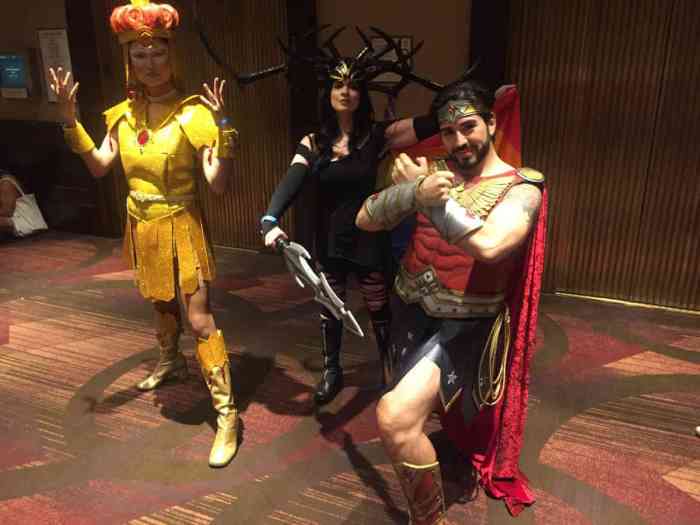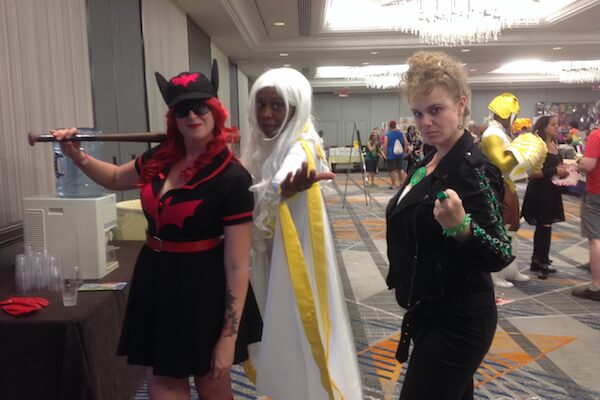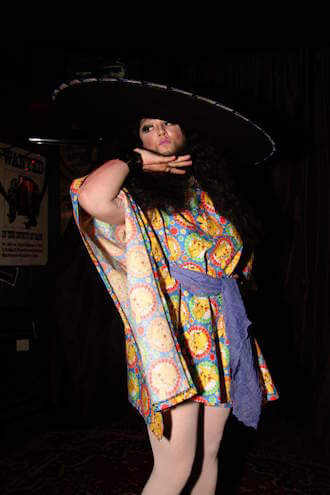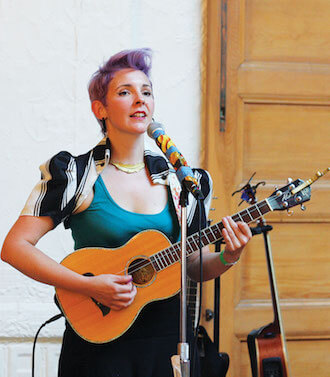Daniel Ketchum, Greg Pak, Richard Bernatovech, Marjorie Liu, and Dan Parent at New York ComicCon. | GAY CITY NEWS
This past weekend, thousands of fans swarmed the Jacob K. Javits Convention Center to attend New York City’s ComicCon. The annual convention showcases the latest in comic culture and includes celebrity appearances, panel discussions, and every piece of merchandise imaginable.
Among the panels was LGBT and Allies in Comics, hosted by Geeks Out and the Times Out. New York Times editor Jude Biersdorfer moderated a panel that included Dan Parent, Marjorie Liu, Rich Bernatovech, Greg Pak, and Daniel Ketchum.
Liu and Bernatovech, both Marvel writers, talked about the character victimization that was too long a key element in LGBT stories. Liu, known for work on Marvel’s “Astonishing X-Men,” strives to twist common storytelling clichés. In 2012, she wrote the first gay wedding story, between superhero Northstar and his boyfriend. Barnatovech is the writer for the “Neverminds” and “Sentinels,” two series with prominent LGBT characters. He credits his distinctive characters to the diversity of his fans and supporters.
Industry pros take a look at the LGBT presence in comics
Pak, a former Marvel writer who notably penned several “Hulk” storylines and developed the alternate universe series “X-Treme X-Men,” takes a more natural approach to writing quality LGBT characters. One of his “X-Treme X-Men” plots made headlines earlier this year for featuring a romantic kiss between fan favorites Wolverine and Hercules. Asked why he chose to “hook those two up,” Pak said the decision came naturally, comparing it to what he learned in improv theater, where the unlikely couples were the ones you got together in the end. “X-Men” has always been a safe haven for minorities, he said, the LGBT community being no exception.
Ketchum, a longtime Marvel editor, compared the LGBT presence in comics to the community’s emergence in Hollywood. LGBT themes, he explained, originally were handled with delicate care and worked their way up the editorial food chain – sometimes going as high as the publisher. For Ketchum, the turning point came with the “Prodigy” storyline, where discussion of the titular character’s sexuality was seamless and natural.
What Does It Mean to Be Queer?: A Fall Arts Special. | MICHAEL SHIREY
More recently, in “Young Avengers,” Ketchum has been looking to push the bar even higher. The series features a relationship between Wiccan, a mutant with magical powers, and Hulking, a Kree-Skrull hybrid modeled after the original Hulk. Ketchum hopes to introduce additional gay characters into current characters’ lives — moving past a “token gay character” mentality.
Coming from outside the Marvel universe, Parent, creator of “Archie” comics’ gay Kevin Keller, talked about the success of his latest plot point — Kevin’s long anticipated first kiss. He also divulged future storylines in the “Archie” universe, including a world travel story. Parent noted that writers have decided to avoid the anti-gay crackdown in Russia, feeling that the material was too heavy for the “Archie” audience.
When the panel was opened up to questions, most focused on fan qualms about DC Comics, which has received a lot of negative attention this year — first, for hiring the homophobic Orson Scott Card to pen the upcoming Superman plot, and second, for refusing to publish a story arc involving Batwoman marrying her trans girlfriend. That latter flap caused the entire writing team for the story to leave DC.
DC has defended itself on the Batwoman issue, arguing that its characters are superheroes plagued by internal conflicts and, thus, not supposed to live happily ever after. Liu argued that concept was simply lazy storytelling. Bernatovech agreed, saying DC’s new direction was alienating the company’s fan base. Pak, who is slated to be the writer for DC’s upcoming Batman/ Superman series, was more sympathetic, comparing comics to glorified soap operas — stories that sometimes lack happy endings.
Other topics raised by the audience included Andrew Garfield’s comments earlier this year about exploring a bisexual Spiderman for the upcoming “Amazing Spiderman” movie as well as the panelists' dream LGBT pairings. One fan in the audience managed to stump panelists, asking about the lack of “asexual” representation in comics.
“Jughead?,” Parent joked. “He’s kind of asexual.”
The panel was in general agreement that it is a good time for LGBT characters in comics, but it could be better. Liu noted that creators and readers alike need to step out of the hetero-normative mindset of storytelling. Pak seconded that, saying that the industry should be creating tons of gay characters, with none required to portray the full range of queer experiences. Keep pushing the envelope was the message panelists had for audience members, who were reminded that their voice is heard through their dollars.




































